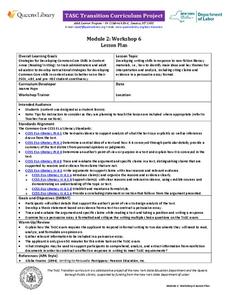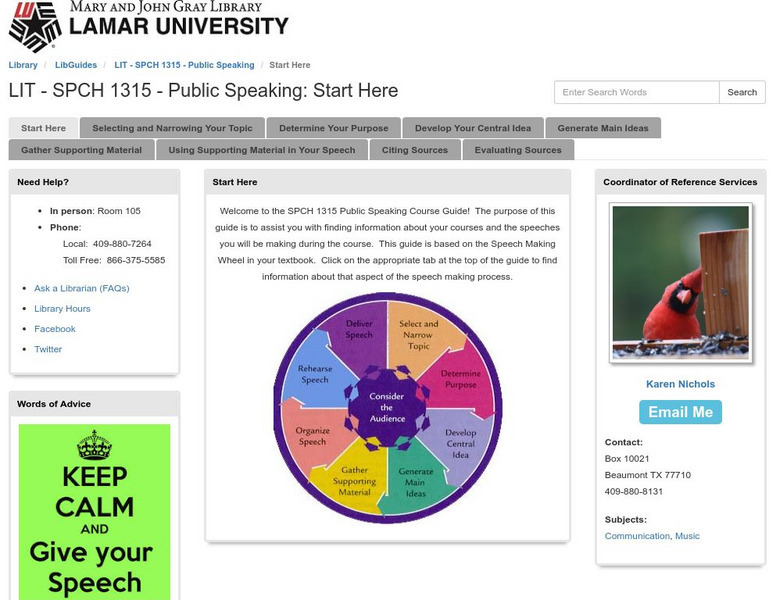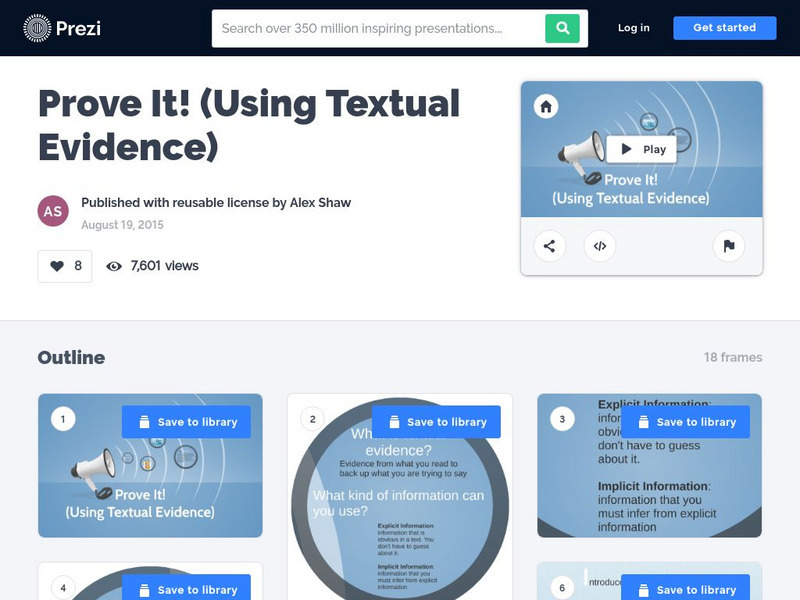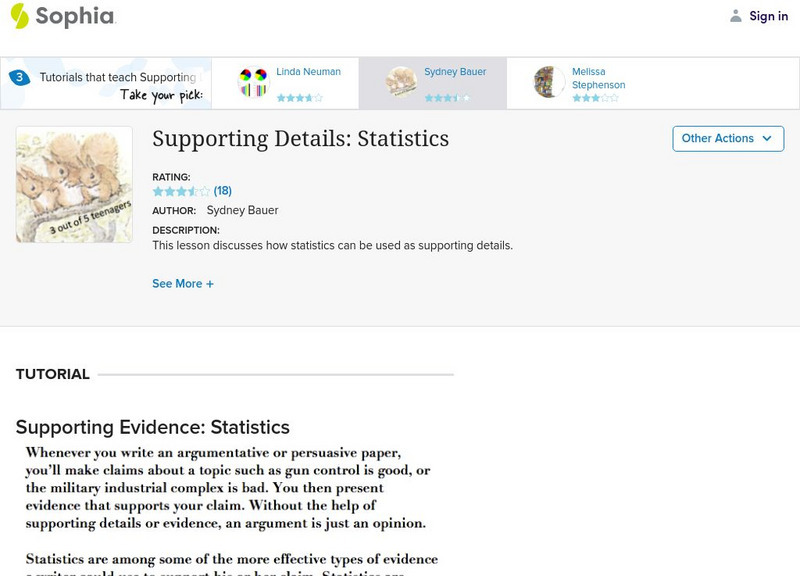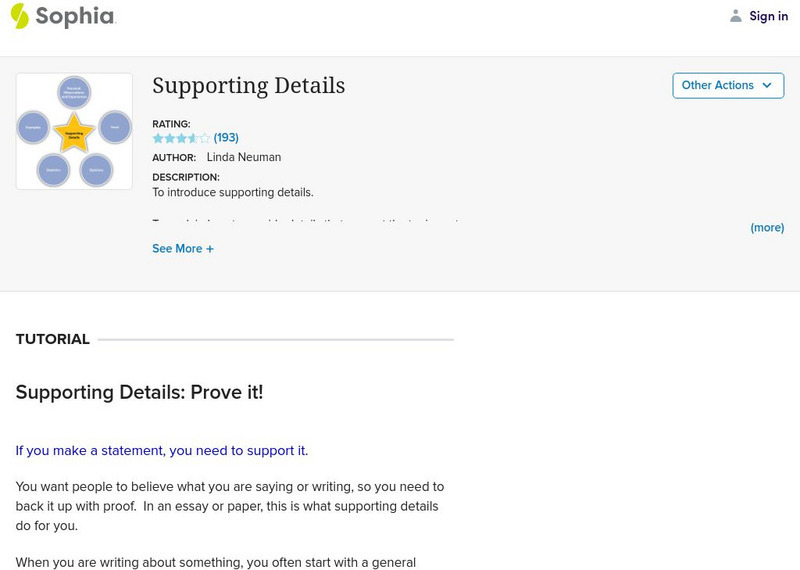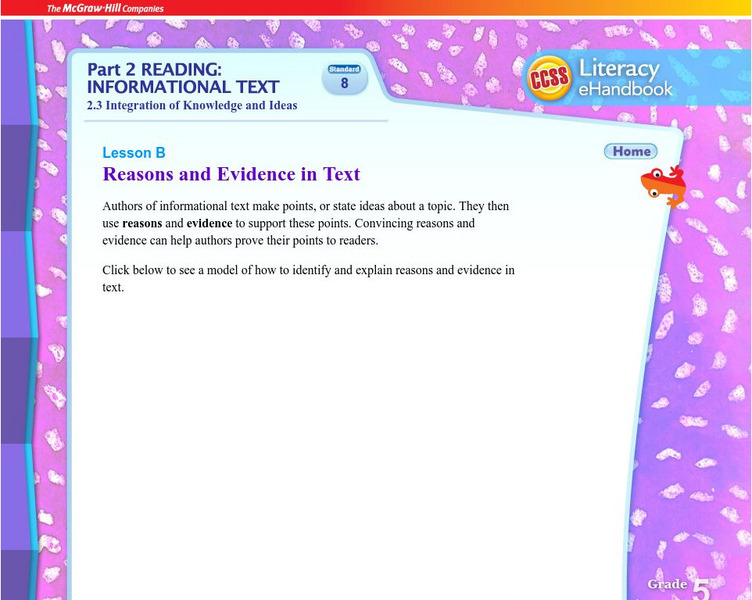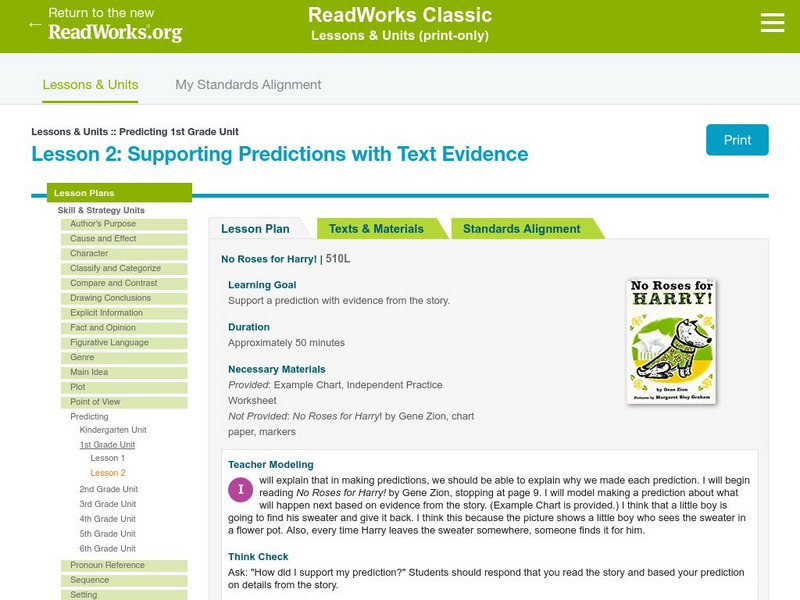New York State Education Department
TASC Transition Curriculum: Workshop 11
You'll C-E-R a difference in classroom achievement after using a helpful instructional activity. Designed for economics, civics, government, and US history classes, participants practice using the CER model to craft arguments about...
New York State Education Department
TASC Transition Curriculum: Workshop 5
Are video games sports? Pupils investigate this question as well as various nonfiction selections to learn more about claims and the support that defines them. All of the selections mimic the rigor on state tests and encourage close...
EngageNY
TASC Transition Curriculum: Workshop 6
Is a college education necessary for success in today's world? The class investigates the question, along with others at the end of the sixth workshop in a 15-part series. The lesson has four parts with multiple activities and...
New York State Education Department
TASC Transition Curriculum: Workshop 3
Teachers turning into students? It's not Freaky Friday! It's a thoughtful workshop that teaches participants how to plan professional development for staff. Third in a 15-part series, the workshop provides a platform for the other...
EngageNY
TASC Transition Curriculum: Workshop 12
How can opinions slant facts? Workshop participants learn how to examine primary and secondary sources and identify the author's point of view. They also examine how visual art impacts the meaning and rhetoric of sources. Full of...
EngageNY
TASC Transition Curriculum: Workshop 15
What do a cheetah, Audi commercial, and air have in common? They're all topics of an engaging inquiry-based, hands-on workshop for educators about background knowledge, reading strategies, the CER model, and argumentative writing. The...
New York State Education Department
TASC Transition Curriculum: Workshop 10
How have educational standards evolved? Educators of adults examine expectations in the 10th workshop out of 15 to better determine how standards have grown. Participants respond to a variety of sample questions to determine how they...
PBS
Pbs: Using Supporting Evidence to Interpret Meaning a Native American Folktale
In this lesson, students will watch a video clip with a Native American storyteller telling a traditional story. Students will use supporting evidence from the story to give meaning to oral and written texts.
University of North Carolina
University of North Carolina: Writing Center: Handouts: Evidence
What kinds of evidence best support the points you make in a paper? Where can you find the evidence you need? This handout answers all these questions and more, including the difference between primary and secondary sources. You'll also...
Other
Public Speaking: Using Supporting Material in Your Speech
The purpose of this website is to assist you with finding information about giving speeches and responding to other speeches or information.
Texas Education Agency
Texas Gateway: Differentiate Among Empirical, Anecdotal, and Logical Evidence
[Accessible by TX Educators. Free Registration/Login Required] In this lesson, students will learn about three types of evidence that writers often rely on: logical, empirical, and anecdotal. It will also help you distinguish among these...
Texas Education Agency
Texas Gateway: Differentiate Among Empirical, Anecdotal, and Logical Evidence
[Accessible by TX Educators. Free Registration/Login Required] This lesson will help you distinguish among three kinds of evidence: logical, empirical, and anecdotal; and see how they are used to support conclusions and arguments in texts.
Other
Prezi: Prove It! (Using Textual Evidence)
Slideshow explains textual evidence and how to use the I.C.E. method when citing it.
Texas Education Agency
Texas Gateway: Understanding Drama
You will learn how to make complex inferences in a play and use textual evidence to support your understanding.
Texas Education Agency
Texas Gateway: Analyze the Relevance, Quality, and Credibility of Evidence
[Accessible by TX Educators. Free Registration/Login Required] In this lesson, students will learn to analyze the quality, relevance, and credibility of evidence used to support an argument.
Texas Education Agency
Texas Gateway: Write a Persuasive Text That Supports a Position
[Accessible by TX Educators. Free Registration/Login Required] You will learn to write a persuasive text that responds to the views of others by using evidence that differentiates between fact and opinion to support your viewpoint.
Sophia Learning
Sophia: Supporting Details: Statistics
This lesson focuses on using statistics as supporting details. It explains why statistics make powerful supporting details, however, these can be skewed to show different outcomes. It suggests looking carefully when using statistics to...
Sophia Learning
Sophia: Supporting Details
This tutorial focuses on supporting details using a video of a paragraph from a book showing the topic sentence and two strong, reliable, supporting details. This is followed by a slideshow that stresses the need for variety in the types...
Sophia Learning
Sophia: Supporting Details Explained
This slideshow focuses on supporting details; it discusses their purpose, the audience, and the point to be made. It lists the five most common types of supporting details: facts, statistics, opinions, examples, and personal observations...
Sophia Learning
Sophia: Supporting Details: Facts and Statistics
This lesson discusses how statistics can be used as supporting details. This tutorial shares a short audio lesson [05:16] and supplemental notes with the lesson's content.
Curated OER
Mc Graw Hill: Part 2 Reading: Informational Text: Reasons and Evidence in Text
Reasons and evidence are given by the author to support topics or ideas. In this resource, learn about finding reasons and evidence in a text. Includes downloadable worksheet.
CPALMS
Cpalms: Stand Tall: Using Evidence to Support Your Answers
This learning module has a series of screencast videos and practice exercises designed to teach students how to support their answers with details from the text.
Polk Brothers Foundation Center for Urban Education at DePaul University
Depaul University: Center for Urban Education: Evaluate Support for a Claim[pdf]
This resource provides a downloadable worksheet to use after reading a nonfiction text. Students will evaluate an author's support for a claim by answering the questions and prompts provided on the worksheet.
Read Works
Read Works: 1st Grade Unit: Supporting Predictions
[Free Registration/Login Required] A lesson utilizing the book No Roses for Harry! by Gene Zionin in which students make a prediction and then support it with details from the text. Ideas for direct teaching, guided practice, and...


